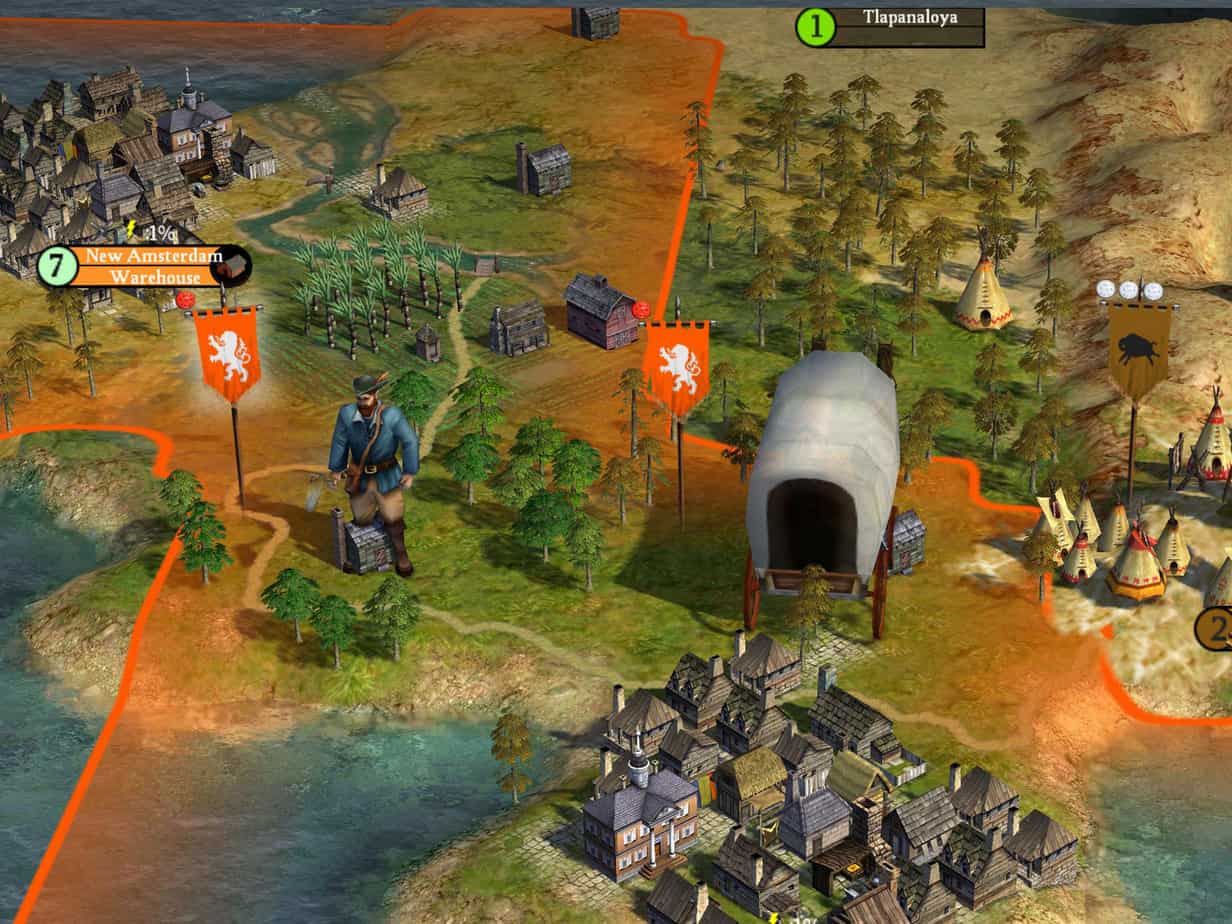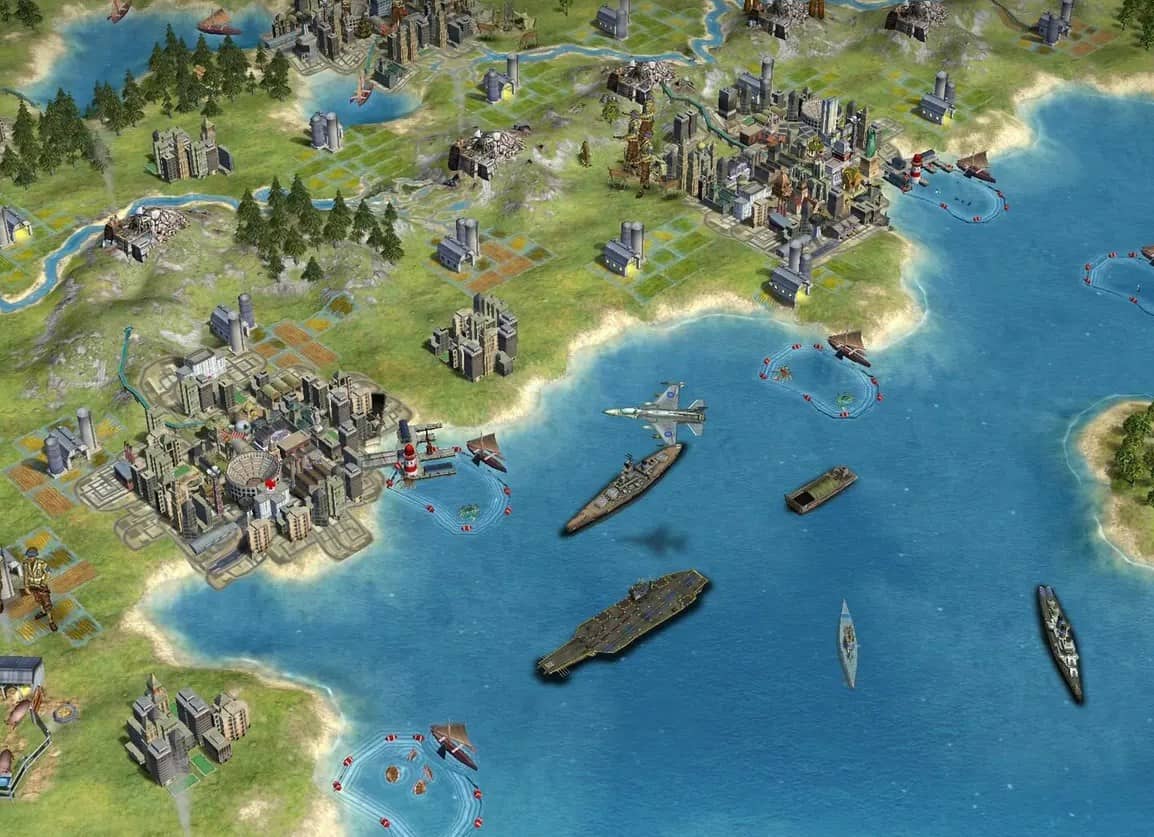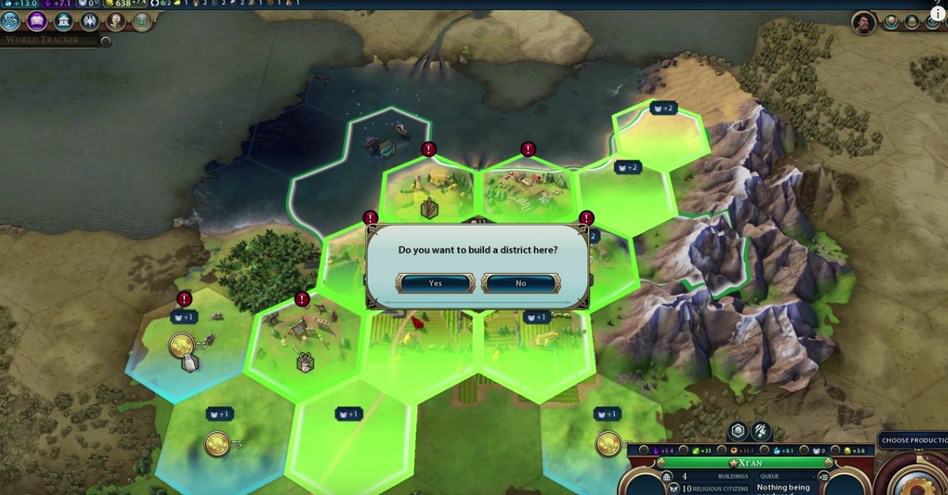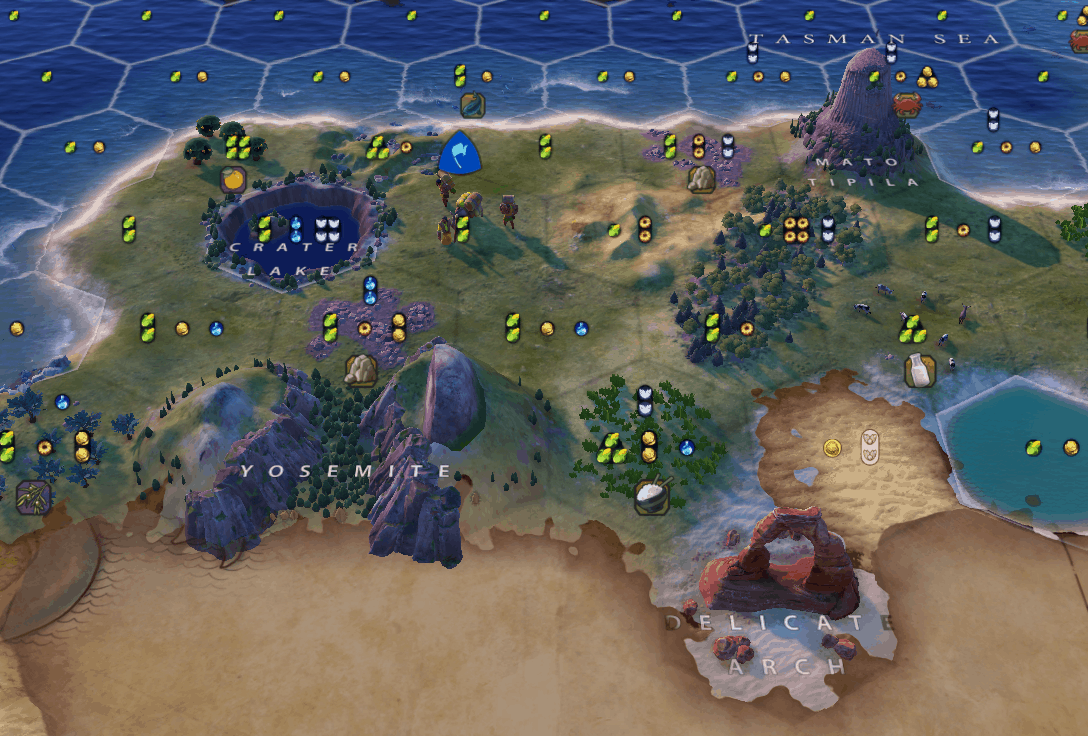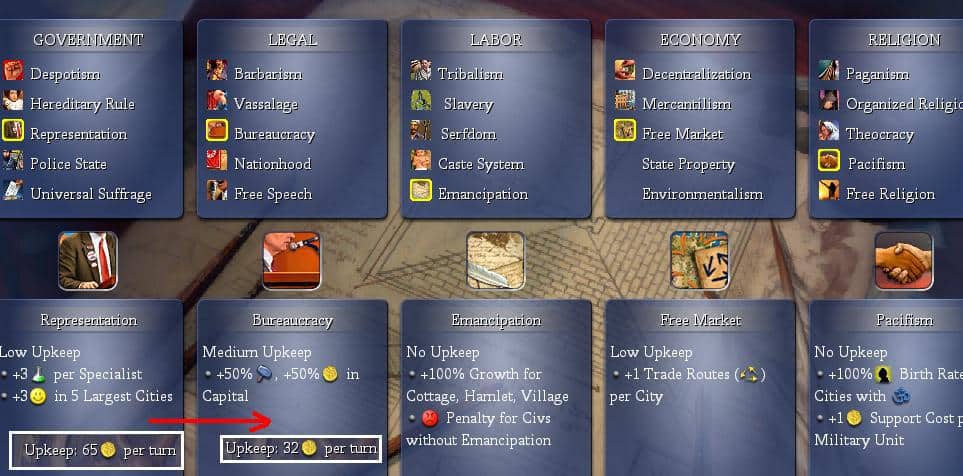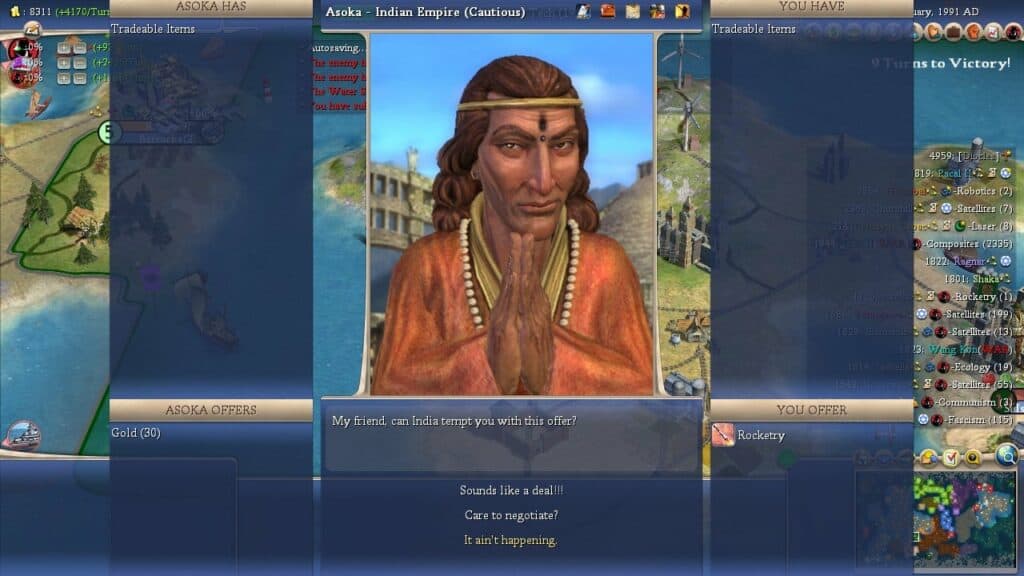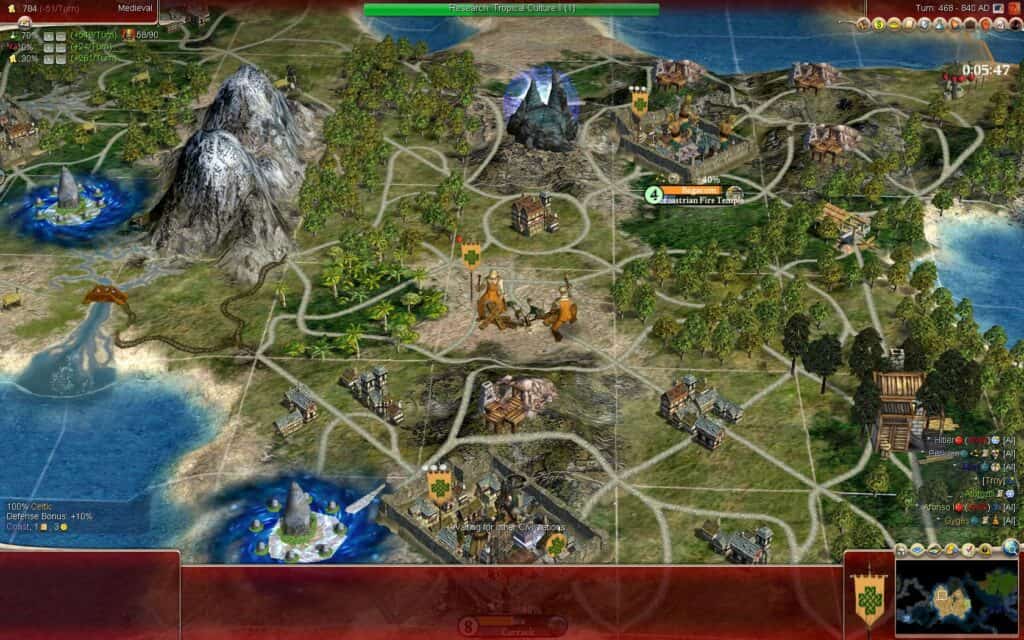- Civ 6 Countries Overview: How to Choose The Right Country? - August 7, 2021
- Civ 6 Tier List: Guide to the Best Civ 6 Leaders - July 6, 2021
- Civ 5 Tier List: Everything You Need to Know - May 23, 2021
Civilization VI is a turn-based strategy game where one or more people compete against AI opponents to grow a small civilization into a global empire. The game was developed by Firaxis Games, published by 2k Games, and distributed by Take-Two Interactive.
You can choose which civilization you want to represent and manage your technology, culture, and government as they grow and evolve through the ages. You will have your population explore the randomly generated world where they will encounter other humans, as well as barbarians who are set on destroying everything you’ve built.
Gameplay
When starting a new game, you will have the ability to choose various options, such as which civilization they will represent, the game difficulty, game speed, map type, and map size. There are eight different difficulty levels, five different game speeds, six map types, and three map sizes available to choose from.
Difficulty Levels from easiest to hardest:
- Settler
- Chieftain
- Warlord
- Prince- Default
- King
- Emperor
- Immortal
- Deity
Game Speeds
- Online: Double speed used for online multiplayer games
- Quick: Quick Game 33% fast
- Standard: Normal Speed
- Epic: 50% slower game speed
- Marathon: 200% slower game speed
Game Maps
- Continents: Earth-like world with several continents and small islands.
- Fractal: Unpredictable world that has many large and small land areas.
- Inland Sea: An island in the middle of a giant ocean. Surrounded on all 4 sides by an ocean with an impassable map border.
- Island Plates: Compromised various islands in all sizes and shapes.
- Pangea: A huge continent with smaller islands being created.
- Shuffle: A randomly generated map setting.
Map Sizes
- Tiny: Perfect for 2.
- Standard: From two to eight players.
- Large: Perfect for 10 players.
Once the game settings have been chosen, you can go ahead and begin your game. Your very first turn in the game will be compromised of building your first city, sending a unit to explore the world, choosing a technology to research. You will also choose your production or the first permanent item you want in your city. You can choose between a monument in the city center, a new unit, or a scout for exploring.
Your next 25 turns will be spent searching for various resources in the nearby area. These resources will help you build and expand your city. New areas can be claimed by building additional cities, allowing your small civilization to expand into a large empire.
As you explore and open new areas on the map, you will come across tribal villages that hold various bonuses like technology and gold to help your empire grow. You will also encounter various barbarians who are intent on destroying what you’ve built. Barbarian scouts, while harmless or the moles in the operation and must be stopped before they reach their village. If not stopped, then the barbarians will send military troops to raid and attack your cities. Lastly, you will also come across city-states, other civilizations, and natural wonders on your quest for exploration and expansion.
Civilizations
With all DLC included, there are 50 different civilizations to choose from in-game. The base game included 18 civilizations upon launch. For those that pre-ordered the game, a 19th civilization was added after 90 days. All of the DLC added eight new civilizations into the game. Civ VI has the largest number of playable civilizations of any Civ game.
Each civilization has three different things that are unique to them. Civilizations themselves have a unit or a piece of infrastructure, such as a building, district, or tile improvement that only they can use as well as an ability. Each leader of civilization also has a unique ability only they can use. Leaders also have a personality and unique goals that shape how they interact with players when controlled by AI. Choosing a leader that best fits your own goals for the game can help with gameplay.
Resources
There are four types of resources that you will want your scouts to look for while they explore the land. The first is strategic resources. These resources are required for certain Civ 6 units to be built or created. Usually, these resources are found through technology research and upgrades. When a city obtains 2 copies of any strategic resource, they can build any number of units that require it.
Certain districts, such as encampment, harbor, and aerodrome or civilizations that have the resource management policy unlocked, can use only one copy to build the units. Strategic resources include things like aluminum, coal, and horses.
Bonus resources provide yield bonuses to local food, production, and gold when improved. They can be harvested, which will remove the resource from production but will give 25 times the typical yield. Bonus resources include things like copper, cattle, fish, wheat, and stone.
Luxury resources are essential in providing amenities in cities. However, a city is only allowed one luxury resource at a time. A luxury resource provides 4 amenities; usually, some will provide 6. You can also trade luxury resources to other civilizations. Luxury resources include things like cinnamon, cocoa, coffee, clothing, and tobacco. There are more luxury resources available than there are strategic or bonus resources.
The last resource is called artifact resources. There are only two available, and they can only be unearthed by archeologists. In order for archeologists to exist, you must first build an archeological museum. The two artifact resources are antiquity site and shipwreck.
Districts
Districts were introduced as a new feature in Civ VI. Each district is a part of the city that is founded outside the city center or the main tile the city exists on and focuses on developing a specific aspect of the city. There are three main aspects of each civilization: military, scientific, and cultural. Different districts will help with those aspects of the civilization and provide different buildings for growth.
For example, the campus district focuses on the scientific aspect and has buildings, such as the library, university, and research lab. While the Theater Square Acropolis focuses on the cultural aspect of the game and has buildings, such as the archeological museum, amphitheater, and art museum.
Separating the essential parts of the game into different districts allows for them to have autonomy and be a more powerful presence within the game. However, this also makes them more vulnerable to attack, but enemies are still required to capture the city center before they have conquered the empire.
Building a district requires a suitable area of land and the necessary civic and technological advancements to be unlocked. You will also need a suitable population size that can fill the number of workers needed for these districts. Every 3 citizens allow for an additional district to be built. Specialty districts can only be built once, while non-specialty districts can be placed multiple times. Districts also can’t be moved, so be careful when planning and make sure that you are happy with the placement of the district when you build it.
Wonders
Wonders are a feature that has been present in civilization games for a long time. They are huge buildings that are named modeled after real-life buildings and landmarks that are still standing today. For example, the Taj Mahl, Stonehenge, and the Pyramids of Egypt all make an appearance within the game. Wonders are also built outside of the city center and take several tiles to be built. Despite their size needs, they offer many bonuses and benefits to the civilization.
Additionally, Civ VI saw the return of wonderful movies that were present in Civ IV. Wonder movies show the wonder being constructed from scratch in 30 seconds. Building a wonder is a rare occurrence and a race between other players. Each wonder can only exist once within the game world.
Natural Wonders
Unlike normal wonders, natural wonders are those that appear in the game naturally. They are unique terrain features that usually cover one to four tiles and are found scattered across the world. Players cannot build on these tiles, but they can reap their benefits by simply being in proximity to their location. When you first settle your civilization, consider settling near a natural wonder for the added benefits.
City-States
City-states are an AI-controlled independent nation found within the game. Unlike other players, city-states don’t compete to be the dominant civilization. Instead, they live within the world and complement it by providing interactions for players. City-states will function similarly to that of the player by gathering resources, making tile improvements, and advancing their tech and culture. However, they aren’t able to build new cities, which limits their expansion abilities and keeps them city-states.
Developing a friendly relationship with a city-state will reward players with bonuses and other special benefits that will help them advance in the game. Players can also choose to conquer and liberate city-states which will allow the empire to absorb them. This will force the city-state to lose its special abilities and will turn it into another city within the empire. Lastly, you can simply choose to ignore city-states completely if you do not want to deal with them. However, they may attack your city; but even if they conquer it, they won’t keep it.
Civics
Civics is Civ VI’s version of social policies and is presented in a research-styled civics tree. Civics enables players to unlock buildings, wonders, obtain bonuses, receive policy cards, and open government types.
Policy cards are a new feature found in Civ VI’s government system. They are supposed to be the incarnation of Social Policies within the game. They can change and affect your political agenda. Policy cards can give bonus stats for culture, gold, and other gameplay elements; they also can accelerate production rates. While there are no right or wrong policy options, some cards work better in different situations, and it’s up to the player to decide which policies will benefit the short term and which benefit them long term. There are four main policy card types:
Military
- These cards are oriented towards combat maintenance, unit production, and strategic resource management.
Economic
- These cards focus on production, yield bonuses, amenities, and housing for the population.
Diplomatic
- These cards focus on city-state relations and diplomacy. They can affect your relationship with other countries and city-states.
Wildcard
- Wildcard policies are oriented towards great people points and legacy bonuses.
Governments are also a part of civics and can be unlocked by researching the code of laws. Each government will give a civilization a unique bonus, a different policy card slot configuration, and if kept for a certain amount of time, an additional legacy bonus will be earned. Each civilization starts with the lowest form of government called chiefdom. From there, they can grow and advance their government. Three tiers of government can be founded through different periods.
Tier One focuses on ancient forms of government and provides four policy slots with basic diplomatic power for the city-states and other civilizations.
- Autocracy
- Oligarchy
- Classical Republic
Tier Two focuses on government found within the middle ages, which are more advanced than ancient governments but not quite the same as the governments we know today. They have six policy slots and moderate diplomatic power.
- Monarchy
- Theocracy
- Merchant Republic
Tier Three focuses on modern forms of government and modern ideology. These are the most powerful governments in the vanilla game and provide eight policy slots and considerable diplomatic power.
If you have Gathering Storm, then a fourth tier of the government is also available. This tier focuses on future government types. While they are powerful, they come with son considerable penalties and can streamline the game into a specific victory. These government types offer ten policy slots, with five being wildcards.
- Synthetic Technocracy
- Corporate Libertarniasm
- Digital Democracy
Religion
Religion is a feature that can be found in earlier iterations of the Civ games. Similar to most features that have been brought into the game from earlier titles, Religion finds itself expanded in Civ VI. To found religion for your civilization, you must first attract a Great Prophet by obtaining Great Prophets points through the finding of holy sites and other faith-based actions.
You will also need to discover a Pantheon before you can use your Great Prophet. You will also choose a symbol and a name for your religion. Some symbols come with names, and others will need a name entered. Next, you will be able to choose two beliefs for your religion. The number of religions that can be founded per game is based on the standard number of default players on a given map size plus a player.
- Duel Game: 2 religions
- Tiny Game: 3 religions
- Small Game: 4 religions
- Standard: 5 religions
- Large: 6 religions
- Huge: 7 religions
Victory Conditions
To win the game, you must complete a victory condition before any other player. You can track your ranking and your opponent’s ranking by using the world ranking panel in the game. Five different victory conditions can be met.
Science
To achieve the science victory, you must launch a satellite, land a human on the moon, and establish a Martian colony. If you have the Gathering Storm DLC, you will need to launch an exoplanet exhibition, as well as help the exoplanet expedition travel 50 light-years. You will want to focus on all the science and production aspects of the game. Building multiple cities with high production and space sports is a must to make this victory achievable.
Culture
To win the cultural victory, you will need to focus on the tourism industry in your country, as well as the cultural statistic. When you have attracted more visiting tourists from every single civilization than they have domestic tourists, you will achieve victory. Domestic tourists are the tourists that are vacationing within their own home country while visiting tourists are tourists that come from other civilizations.
Domination
To win the domination victory, you must conquer the original capital of every civilization, regardless if they are still in play or not. Focusing on a strong military and advanced technology will help make this victory easier to achieve. However, you must be aware of various penalties that happen as a result of war. These penalities affect the relationship your civilization has with other civilizations and the relationship you have with the population of your civilization.
Religion
To achieve religious victory, your religion must be the most predominant in every civilization you are playing against. When half of a civilization’s cities follow your religion, it will be considered the dominant religion in that civilization. Religion is naturally spread to cities that are within 10 tiles of each other. You can also use missionaries and apostles to spread your word and convert people to your religion. Religious units can also be killed to gain a bigger following towards your religion.
Diplomacy
Diplomacy is introduced in the Gather Storm DLC. To achieve diplomatic victory, you must reach a certain amount of diplomatic victory points. The standard amount is 20 diplomatic points. You can gain and lose points through various means, including voting for the winning outcome of a World Congress and building various land important landmarks like the Statue of Liberty and Potala Palace.
You can also research seasteads, discover global warming mitigation, earn the higher score in aid requires, and winning first place in a non-emergency score competition.
Score
A score victory happens when no players have achieved another victory condition when the turn counter runs out. The points are calculated differently depending on if DLC is installed.
Vanilla Point Calucations
- 5 points for each city-owned.
- 5 points for each wonder owned.
- 3 points for each district-owned.
- 3 points for each Great Person earned.
- 2 points for each belief after founding a religion.
- 2 points for each technology researched.
- 1 point for each citizen in the empire.
DLC Point Calculations
- Era Score Points
- 15 points for each wonder owned.
- 10 points for founding a religion.
- 5 points for each great person earned.
- 5 points for each city-owned.
- 3 points for each civic researched.
- 2 points for each foreign city following the player’s religion.
- 2 points for each technology researched.
- 2 points for each district-owned or 4 for a unique district.
- 1 point for each building.
- 1 point for each citizen in the empire.
Expansions & DLC
Civilization VI has two expansion packs and seven DLC, and one DLC bundle pass. Expansion packs focus more on adding new features or tweaking existing features. DLC focuses on adding scenarios and new civilizations. Expansion Pack also features new civilizations.
Expansion Packs
Rise and Fall is the first expansion pack and was released on February 8th, 2018. The expansion pack adds a variety of new content into the game, including an age system so you can experience the Golden Ages and Dark Ages, loyalty system, governors, emergencies, a timeline history feature, and new civilizations. Global content was also added into the game, including wonders, districts, and units.
Gathering Storm is the second expansion pack and was released on February 14th, 2019. There were several different types of content added into the game including, environmental effects, power, a world congress, the 21st-century era, and engineering. New scenarios, civilizations, and leaders were also added to the game.
New Frontier Pass
The New Frontier Pass is a series of DLC that was released bi-monthly through May 2020 to March 2021. The pass included eight new civilizations, six new game modes, and nine new leaders.
- Maya & Gran Columbia Pack: Released May 21st, 2020.
- Ethiopia Pack: July 23rd, 2020.
- Byzantium & Gaul Pack: September 19, 2020.
- Babylon Pack: November 19, 2020.
- Vietnam & Kubalia Khan Pack: January 28, 2021
- Portugal Pack: March 25th, 2021.
DLC
- Aztec Civilization Pack: Free pack that adds the Aztec Civilization. Released on November 19th, 2016.
- Poland Civilization and Scenario Pack: Adds the Polish Civilization and Jadwiga’s Legacy scenario. Released December 20, 2016.
- Vikings Scenario Pack: Adds Vikings, Traders, and Raiders scenario, new natural wonders, and city-states. Released December 20, 2016.
- Australia Civilization & Scenario Pack: Adds Australian Civilization, a new scenario, and new natural wonder. Released February 23rd, 2017.
- Persia and Macedon Civilization & Scenario Pack: Adds the Persian and Macedonian civilizations, new wonders, and scenarios. Released March 28th, 2017.
- Nubia Civilization & Scenario Pack: Adds the Niban civilization a new scenario and a new wonder. Released July 27th, 2017.
- Khmer and Indonesia Civilization & Scenario Pack: Adds the Khmer and Indonesian civilization a new scenario, new wonders, and a new map.
Final Thoughts
When Civilization VI was released, it paled in comparison to its predecessor Civilization V. Understandably, this game had big shoes to fill as Civ V took the series to a whole new level. Civ VI focused on expanding the success of Civ V by adding new features, expanding old ones, and challenging players.
Over time with the release of DLC, expansion packs, and updates, Civ VI has proven to be a fun and enjoyed title in the Civilization series. It may not have completely recreated the series, but it holds its own with new gameplay, expanded features, and a whole new idea on what it takes to bring civilization to the top.
FAQs
Answer:
Minimum Requirements:
• OS: Windows 7 64bit / 8.1 64bit / 10 64bit
• Processor: Intel Core i3 2.5 GHz or AMD Phenom II 2.6 GHz or greater
• Memory: 4 GB RAM
• Hard drive: 12 GB or more
• DVD-Rom: Required for disc-based installation
• Video card: 1 GB DirectX 11 Video Card (AMD 5570 or Nvidia 450)
Recommended Requirements:
• OS: Windows 7 64bit / 8.1 64bit / 10 64bit
• Processor: Fourth-generation Intel Core i5 2.5 GHz or AMD FX8350 4.0 GHz or greater
• Memory: 8 GB RAM
• Hard drive: 12 GB or more
• DVD-Rom: Required for disc-based installation
• Video card: 2 GB DirectX 11 Video Card (AMD 7970 or Nvidia 770 or greater)
Answer: Yes, you can! Civ VI can be a great way to pass the time when traveling or somewhere without decent internet access. You will simply play against AI opponents instead of other people. The great thing about this game is that you can play with or without other players making it versatile and capable of fitting multiple different types of players.
Answer: Yes, multiplayer gameplay is a hallmark of the game. You can play with friends or with complete strangers. When playing a multiplayer game, it’s important to remember that the host will decide all of the game settings. Playing against strangers can make for a challenging or sometimes frustrating game as not every player will play the game fairly or nicely.


